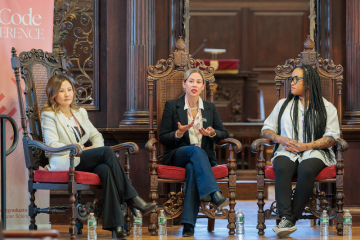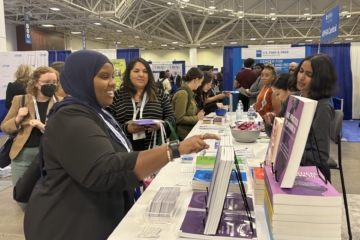
A total of $40,000 in prizes are being awarded for the top three submissions and two honorable mentions. HealthData+, a partnership between the Public Health Institute and Live Stories, was selected for the top prize of $20,000. RTI International won second place with its Neighborhood Map of U.S. Obesity, and a collaboration between GeoHealth Innovations and Community Health Solutions secured third place for their Health Demographic Analysis Tool. HeartSmartKids received an honorable mention for its patient-focused application, and the U.S. Obesity and Healthy Living Locator received an honorable mention for its consumer focus.
“In order to have a meaningful impact on the obesity epidemic in the US, we need innovative solutions that integrate multiple perspectives. The creativity shown in the Obesity Data Challenge entries reinforces the promise of technology and data in helping address some of our most vexing health problems,” said Ed Hunter, President and CEO of the de Beaumont Foundation. “The winners show that there are tools that can help improve access to data by health officials, improve public and patient awareness of obesity and steps to address it, and bring sophisticated data to life without requiring users to have advanced analytic skills.”
The diverse panel of judges evaluated entries based on five criteria:
- How creative and innovative is the proposed solution?
- To what degree does this solution utilize evidenced-based treatments or approaches?
- What is the potential impact on health care or population health?
- Will clinicians and public health practitioners find this solution both usable and applicable to their work?
- How functional is the proposed tool or solution?
Additionally, all entries had to incorporate at least one source of open government data.
“We were happy to see that people used a wide variety of government datasets and visualization tools to develop their ideas. The diversity of submissions speaks to the importance of opportunities like this Challenge to bring different perspectives together onto one platform to meaningfully address obesity,” said Susanna Fox, chief technology officer at the U.S. Department and Health and Human Services.
The winning entries are:
- Healthdata+Obesity (1st place) — This simple, curated dashboard helps health officials tell a powerful story about the root causes of obesity. The dashboard provides customizable data visualizations at the national, state, and local level as well as an interactive map, national benchmarks, and written content to contextualize the data. Developed by HealthData+, a partnership between the Public Health Institute and LiveStories.
- The Neighborhood Map of U.S. Obesity (2nd Place) — This highly-detailed, interactive map incorporates obesity data with a GIS database to provide a localized, high-resolution visualization of the prevalence of obesity. Additional data sources can also be added to the map to allow researchers and health officials greater flexibility in customizing the map to support analysis and decision-making on a community level. Developed by RTI International.
- The Health Demographic Analysis Tool – Visualizing The Cross-Sector Relationship Between Obesity And Social Determinants (3rd Place) — This interactive database maps the relationship between the social determinants of health (factors like educational attainment, income, and lifestyle choices) and health outcomes in order to illustrate what plays a role in community health. The powerful images generated by this tool provide compelling material for new health interventions as well as a way to look retrospectively at the impact of existing public health campaigns. Developed by GeoHealth Innovations and Community Health Solutions.
- U.S. Obesity and Healthy Living Locator (Honorable Mention) — This data visualization tool provides a user interface that integrates obesity data with county-level information on physical activity, access to nutritional food, and socioeconomic status. Researchers are able to compare these statistics at a glance in order to inform more precisely-targeted public health interventions. Developed by Auychai Suvanujasiri and Hongwei Zhang.
- Obesity Prevention Through Conversation (Honorable Mention – Consumer-Focused) — This app creates a template for clinicians to engage patients in productive, data-driven conversations about their health. Combining a patient risk summary with a health dashboard and discussion prompts, this tool facilitates positive, patient-centered counseling around obesity. Developed by HeartSmartKids.
“The impressive breadth of solutions submitted to the Obesity Data Challenge reflect the transformative power of open health data to ignite innovation and foster collaboration among health data users and stakeholders for the benefit of all people,” said Chris Boone, PhD, chief executive officer of Health Data Consortium. “We must all strengthen our commitment to making data accessible and actionable so that innovative organizations like these Challenge awardees can continue to put data to work to improve the health of individuals and our communities.”




